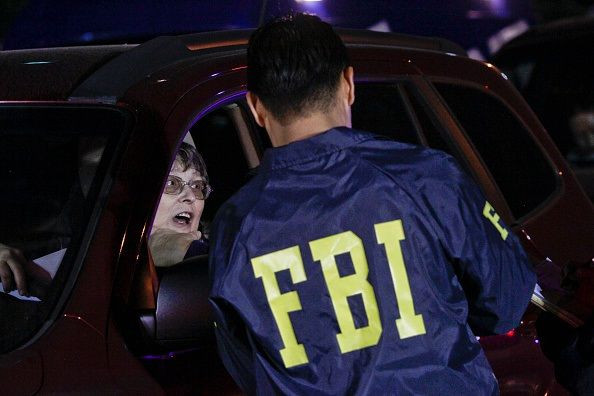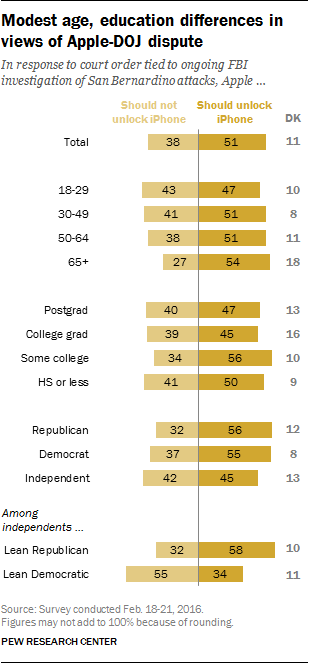Apple vs. FBI: Narrow Majority Want Apple To Unlock San Bernadino Shooter's iPhone, Pew Study Finds

The slimmest majority of American adults believe that Apple should accede to the government's demand that it unlock the iPhone of San Bernardino shooter Syed Rizwan Farook. Research published Monday by the Pew Research Center finds that 51 percent of American adults believe Apple should cooperate with the FBI and unlock the phone; 38 percent say Apple should not unlock it; and 11 percent offered no opinion on the question.
Pew conducted its research, a poll of 1,002 American adults living in the continental United States, as the standoff between the FBI and the world's richest company is now a hot-button issue, not just among technology and privacy wonks but among the general public. While the loudest voices online have given support to Apple's position, Pew's research appears to suggest that the American public feels that the government is in the right.
Republican presidential front-runner Donald Trump, himself an iPhone user, was the first politician to voice an opinion on the matter, calling for a boycott of Apple until the company cooperated with the government’s investigation. Trump's status as an iPhone user who opposes Apple's position is not unusual: Pew found 47 percent of iPhone owners felt that Apple should comply, compared to 43 percent of iPhone owners who felt the company should not.
Darrell Issa, who represents a district of Southern California and is considered a technology and privacy authority within Congress, sided with Apple, telling CNBC Monday that if Apple does this once, it will certainly be required to do it again. "We have a long history of law enforcement not wanting you to have security while not answering questions," said Issa, a Republican. "That is not what the American people want and now what the Consitution envisions.
Previous polling conducted by Pew finds that 93 percent of American adults believe that it's very important to be in control of who can access information about them.

As this story has dominated headlines over the past week, its details have seeped, by media osmosis, into the American consciousness: 75 percent of Americans say they've heard at least a bit about the case, with 39 percent saying they've heard a lot, and 36 percent saying they've heard a little.
The support for the government's motion to compel Apple is almost equal among Democrats (56 percent) and Republicans (55 percent).
Yet some are calling for this case to be decided through the legislative process. Sunday night, the FBI Director James Comey wrote an op-ed suggesting as much. “That tension should not be resolved by corporations that sell stuff for a living. It also should not be resolved by the FBI, which investigates for a living,” Comey wrote. “It should be resolved by the American people deciding how we want to govern ourselves in a world we have never seen before.”
The Justice Department filed a motion Tuesday that would compel Apple to comply with a court order to unlock the iPhone of Farook, one half of the duo that killed 14 and injured 22 more at a holiday party Dec. 2 in San Bernardino, Calif., setting the stage for a legal battle that may have to be settled by the U.S. Supreme Court. That motion would require the device maker, which also authored the mobile operating system that runs Farook’s phone, to adjust that operating system to give authorities an unlimited number of guesses at the alleged terrorist’s password. The version of Apple’s operating system currently on the phone would erase all of the information saved on it after 10 incorrect guesses.
Apple has until Friday to appeal the Justice Department motion, and there are a number of avenues Apple’s legal team could head down in its appeal, including arguments that the DOJ’s order would violate the company’s first amendment rights.
Apple CEO Tim Cook has framed the government’s move as a dangerous one with far-reaching implications. “At stake is the data security of hundreds of millions of law-abiding people, and setting a dangerous precedent that threatens everyone’s civil liberties,” Cook wrote in a memo distributed to all of Apple’s employees.
The government has taken a dim view of the device maker’s stance. Its legal team called Apple’s resistance a “marketing strategy,” and refuted Apple’s claim that its request to get into one phone would create a backdoor that could compromise the millions of iPhones in use around the world.
“The order will facilitate only the FBI’s efforts to search the phone,” reads the Justice Department's motion. “It does not require Apple to conduct the search or access any content on the phone. Nor is compliance with the order a threat to other users of Apple products. Apple may maintain custody of the software, destroy it after its purpose under the Order has been served, refuse to disseminate it outside of Apple, and make clear to the world that it does not apply to other devices or users without lawful court orders.”
If the court winds up siding with the government, it wouldn't be the first time Apple has unlocked one of its devices in response to a government request. In a paper filed as part of a separate legal proceeding in October 2015, Apple acknowledged that "it has, in prior instances, complied with data extraction demands that have been contained in the body of search warrants, or, less often, All Writs Act orders." Apple complied with those orders prior to the release of iOS 8, a mobile operating system that has security measures enabled by default. All subsequent operating systems, including the one found on Farook's phone, include that feature.
© Copyright IBTimes 2025. All rights reserved.



















